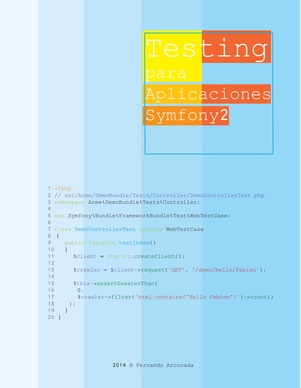Below you will find pages that utilize the taxonomy term “TDD”
The PHP testing experience: Interview by Fernando Arconada
 Fernando Arconada interviewed me about the subject of testing. He is writing a book about testing Symfony2 applications: Testing para Aplicaciones Symfony2. Fernando will translate this interview to Spanish and and add it to his book, together with the articles in my A better PHP testing experience series.
Fernando Arconada interviewed me about the subject of testing. He is writing a book about testing Symfony2 applications: Testing para Aplicaciones Symfony2. Fernando will translate this interview to Spanish and and add it to his book, together with the articles in my A better PHP testing experience series.
Who is Matthias Noback?
I’m a PHP developer, writer and speaker. I live in Zeist, The Netherlands, with my girlfriend, a son of 9 and our newborn daughter. Currently I have my own business, called Noback’s Office. This really gives me a lot of freedom: I work as a developer on one project for about half of the week and in the remaining time I can either spend some time with my family or write blog posts, or finish my second book.
A better PHP testing experience: Introduction
This is the introduction to a series of articles related to what I call: the “PHP testing experience”. I must say I’m not really happy with it. And so are many others I think. In the last couple of years I’ve met many developers who experienced a lot of trouble while trying to make testing a serious part of their development workflow. It is, I admit, a hard thing to accomplish. I see many people fail at it. Either the learning curve is too steep for them or they are lacking some insight into the concepts and reasoning behind testing. This has unfortunately led many of them to stop trying.
Symfony2 & TDD: Testing a Configuration Class
Some of you may already know: I am a big fan of TDD - the real TDD, where you start with a failing test, and only write production code to make that specific test pass (there are three rules concerning this actually).
The TDD approach usually works pretty well for most classes in a project. But there are also classes which are somewhat difficult to test, like your bundle’s extension class, or its configuration class. The usual approach is to skip these classes, or to test them only using integration tests, when they are used in the context of a running application. This means you won’t have all the advantages of unit tests for these “units of code”. Some of the execution paths of the code in these classes may never be executed in a test environment, so errors will be reported when the code is running in production already.